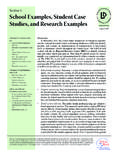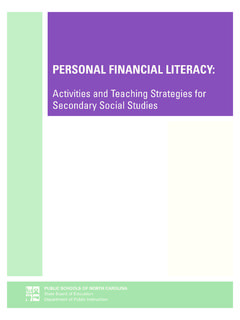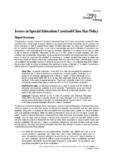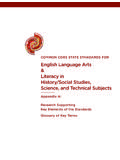Transcription of School leadership development strategies: Building ...
1 Improving School leadership Activity Education and Training Policy Division DIRECTORATE FOR EDUCATION School leadership development strategies : Building leadership capacity in victoria , australia A case study report for the OECD activity Improving School leadership by: Peter Matthews (Rapporteur) Hunter Moorman Deborah Nusche December 2007 2 TABLE OF CONTENTS School leadership development strategies : Building leadership capacity IN victoria , australia .. 4 1. Introduction: Some background .. 4 Why and how to explore strategic approaches to the development of School leadership ? .. 5 The case study visit to victoria , 6 2. The Victorian 7 Social and Economic Context .. 7 Educational Performance .. 8 Relationship between the State and the Country .. 8 Schools in victoria .. 9 School governance and leadership .. 9 3. School Improvement Policy: Blueprint for Government Schools .. 10 Agenda for Action: the Seven Flagship strategies .
2 11 A Research-based Approach to System-wide Improvement .. 13 4. Strategy for Building leadership capacity .. 14 Creating a Culture of Reflective leadership and Developmental Learning .. 15 Multi-layered System-wide leadership .. 16 The Conceptualisation of leadership .. 17 Building leadership capacity .. 19 5. Features of the leadership development Programmes .. 19 Practice-based and Tailored Programmes .. 22 Academic and Other Provider-led Programmes .. 23 Programmes Funded by Central Government .. 24 6. Program Effectiveness and Continuous Program Improvement .. 24 7. Policy Conditions, Implementation and Impact .. 26 Continuing Political Support .. 26 Strategic Alignment .. 26 An Intelligent Accountability 26 Timing and Resourcing .. 27 Evidence of Impact .. 27 8. Food for thought .. 28 A World Class Approach? .. 28 Further Strengths of the Victorian leadership development Strategy .. 29 Challenges .. 30 Sustainability.
3 31 REFERENCES .. 32 ANNEX 1. VISIT PROGRAMME .. 34 3 Boxes Box 1: The OECD Improving School leadership Activity .. 4 Box 2: Criteria for the selection of OECD School leadership development innovative case studies .. 6 Box 3. Outline of the Blueprint for Government Schools commitments .. 12 Box 4: Comment by School leaders on Chapter 2 of leadership on the Line by Ron Heifetz and Marty Linsky (issued to all principals by the OGSE) circulated in the fortnightly newsletter .. 15 Box 5: Developmental Learning Framework for School Leaders domains and capabilities .. 17 Box 6: Developmental leadership Profiles in the Educational leadership Domain .. 18 Box 7. Professional learning programmes for current and aspirant 21 Box 8: High Performing Principals: Experiences and Impact .. 22 Box 9: Teachers Professional Leave: Experiences and Impact .. 22 4 School leadership development strategies : Building leadership capacity IN victoria , australia This report is part of a larger OECD study exploring School leadership policy issues (Box 1).
4 It aims to provide information and analysis on the strategic approach to School leadership development in the Federal State of victoria in australia . The Victorian approach was selected by the OECD Improving School leadership activity as an innovative example of School leadership development because of the State s remarkable drive to improve School effectiveness, in which leadership development plays a central part. The Victorian School improvement and leadership development strategies are thoroughly informed by national and international research. Implementation of the leadership development strategy reflects a close relationship between the Victorian education administration and School principals, in which the Ministerial Department provides consistent system leadership . This report is based on a study visit to victoria , australia , organised by the Office for Government School Education (OGSE) of the Department of Education and Early Childhood development (DEECD), at the request of the OECD in August 2007.
5 It aims to illustrate State-wide developments in educational leadership , showing the interface between the central leadership and the framework of leadership development with which schools are becoming engaged. The report begins with an overview of the systemic, State-wide approach to Building leadership capacity and a shared School improvement culture within a highly devolved system. It shows how the model has been developed in the Victorian and Australian context, reviews the main features of the approach, and provides examples of leadership development in action. It concludes by analysing practice in terms of constructs and impact, highlighting features that may be of interest to other systems, and identifies matters that will be keys to the sustainability and impact of the strategy. 1. Introduction: Some background School leaders in OECD countries are facing challenges and pressures with the rising expectations for schools related to rapid and constant technological innovation, massive migration and mobility, and increasing economic globalization.
6 As countries struggle to transform their educational systems to prepare all young people with the knowledge and skills needed to function in a rapidly changing world, the roles and expectations for School leaders have changed radically. They are no longer expected to be merely good managers but leaders of schools as learning organizations. Effective School leadership is increasingly viewed as key to large-scale education reform and to improved educational outcomes. This is the reason OECD has developed an activity on this topic (Box 1). Box 1: The OECD Improving School leadership Activity The purpose of the OECD activity is to provide policy-makers with information and analysis to assist them in formulating and implementing School leadership policies leading to improved teaching and learning. The activity has the following objectives: (i) to synthesise research on issues related to improving leadership in schools; (ii) to identify innovative and successful policy initiatives and practices; (iii) to facilitate exchanges of lessons and policy options among countries; and (iv) to identify policy options for governments to consider.
7 5 Methodology: Parallel complementary approaches have been developed to achieve these objectives more effectively. All 22 participating countries are providing a country background report within a common framework (analytical strand). Additionally, a small number of case studies in a) School leadership for systemic improvement and b) training and development of School leaders will complement the work by providing examples of innovative practice (innovative case study strand). This approach permits the collection of information necessary to compare country developments while at the same time adopting a more innovative and forward looking approach to policy making. All documents can be found on the activity website: Participating countries: australia , Austria, Belgium (Flanders), Belgium (France), Chile, Denmark, Finland, France, Hungary, Ireland, Israel, Korea, The Netherlands, New Zealand, Norway, Portugal, Slovenia, Spain, Sweden, United Kingdom (England), United Kingdom (N.
8 Ireland), United Kingdom (Scotland). The definition of School leaders guiding the overall OECD activity suggests that effective School leadership may not reside exclusively in formal positions but instead be distributed across a range of individuals in the School . Principals, managers, academic leaders, department chairs, and teachers can contribute as leaders to the goal of learning-centred schooling. The precise distribution of these leadership contributions can vary and can depend on factors such as governance and management structure, levels of autonomy and accountability, School size and complexity, and levels of student performance. Principals can act as leaders of schools as learning organizations which in addition can benefit and contribute to positive learning environments and communities. Why and how to explore strategic approaches to the development of School leadership ? School leaders roles have changed from practising teachers with added responsibilities to full-time professional managers of human, financial and other resources accountable for their results.
9 This has meant that more and more tasks have been added to the job description: instructional leadership , staff evaluation, budget management, performance assessment, accountability, and community relations, to name some of the most prominent ones. In this environment, the range of knowledge and skills that effective School leaders need today is daunting: curricular, pedagogical, student and adult learning in addition to managerial and financial skills, abilities in group dynamics, interpersonal relations and communications. However, the picture concerning the availability and quality of training and professional development of School leaders across the OECD countries is mixed. While there is evidence that many countries now provide School principals and senior staff with significantly more training, and support than they received in the past, opportunities for School leaders in this area leave room for improvement.
10 For example, a research study surveying new principals in Europe (Bolam et al, 2000) found that 65% had received no formal or structured preparation for the job. Moreover, some preparation and professional development programmes may not be effective in preparing School leaders for today s challenges. We need better quality information on the degree to which different preparation and development programmes have actually contributed to improved School leadership : Programmes may vary in structure, content and effectiveness. Some of the differences perceived depend on how the role of School leadership is conceived. Whether School leadership development focuses on managerial responsibilities, including business skills and resource management, and/or on instructional leadership skills will depend on the level of autonomy and decentralisation granted to schools and the roles leaders are asked to play.

















